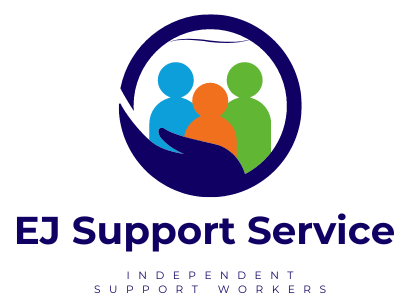Expert Disability Support and Compassionate Care in Coffs Harbour
Dedicated to providing compassionate and tailored disability support services in Coffs Harbour, EJ Support Services is here to empower individuals to live their best lives. Learn more about us and how we can assist you or your loved ones today.
Empowering Disability Support Services
We're committed to enriching the lives of individuals with disabilities. Our experienced team focuses on delivering personalised care and support to clients aged 18-65, empowering them to lead independent and fulfilling lives. With a compassionate and skilled approach, we aim to ensure that every client feels valued and supported throughout their journey with us. Our holistic care model addresses both physical and emotional well-being, creating a supportive and inclusive environment that fosters positive outcomes for our clients and their families.
Frequently Asked Questions
What is a support worker and who needs it?
A support worker involves assisting individuals who are unable to perform daily activities independently due to age, illness, disability, or injury. It also includes elderly people, individuals with chronic illnesses, or those recovering from surgery.
What types of support services are available?
Our support services include:
- Personal care (bathing, dressing, grooming).
- Meal preparation and feeding.
- Medication prompting and monitoring.
- Mobility assistance
- respite
- Companionship and emotional support.
- Transportation to appointments.
- Light housekeeping plus shopping
How do I know if a loved one needs support?
Signs include:
- Difficulty with daily tasks like cooking, cleaning, or bathing.
- Memory issues or signs of dementia.
- Recent hospitalization or declining physical health.
- Feelings of loneliness or isolation.
- Safety concerns, such as frequent falls.
What qualifications should I look for in a support worker?
A qualified support worker should have:
- Relevant training or certifications (e.g., first aid, CPR, aged care or disability qualifications).
- Experience with similar clients or conditions.
- Empathy, patience, and strong communication skills.
- References or recommendations from previous employers.
What is the difference between in-home care and assisted living?
- In-home care: Care is provided in the comfort of the individual's home, tailored to their needs.
- Assisted living: Involves moving to a facility where staff provides care and the individual may have access to shared amenities.
How much does support service cost?
Costs vary based on the type of care, location, and hours required. On average:
- Hourly rates are reasonable and negotiation able
- Live-in caregivers may cost more, but package deals can offer savings.
How are support workers vetted?
Support workers are typically vetted through:
- Background checks.
- Verification of certifications and training.
- Interviews to assess skills and personality fit.
- Reference checks from previous clients or employers.
Can support services accommodate special medical needs?
Yes, many support workers are trained to manage medical conditions such as:
- Dementia or Alzheimer’s.
- Diabetes management.
- Mobility challenges (e.g., use of lifts or wheelchairs).
- Administering medications or monitoring vital signs.
What is respite care, and how does it help?
Respite care is temporary support that allows primary caregivers (like family members) to take a break. It can last a few hours, days, or weeks, depending on the arrangement.
How do I communicate my loved one’s needs to the support worker?
Create a care plan that includes:
- A list of daily routines and preferences.
- Medical history and current medications.
- Emergency contact information.
- Specific instructions for handling challenging behaviours or other situations.

